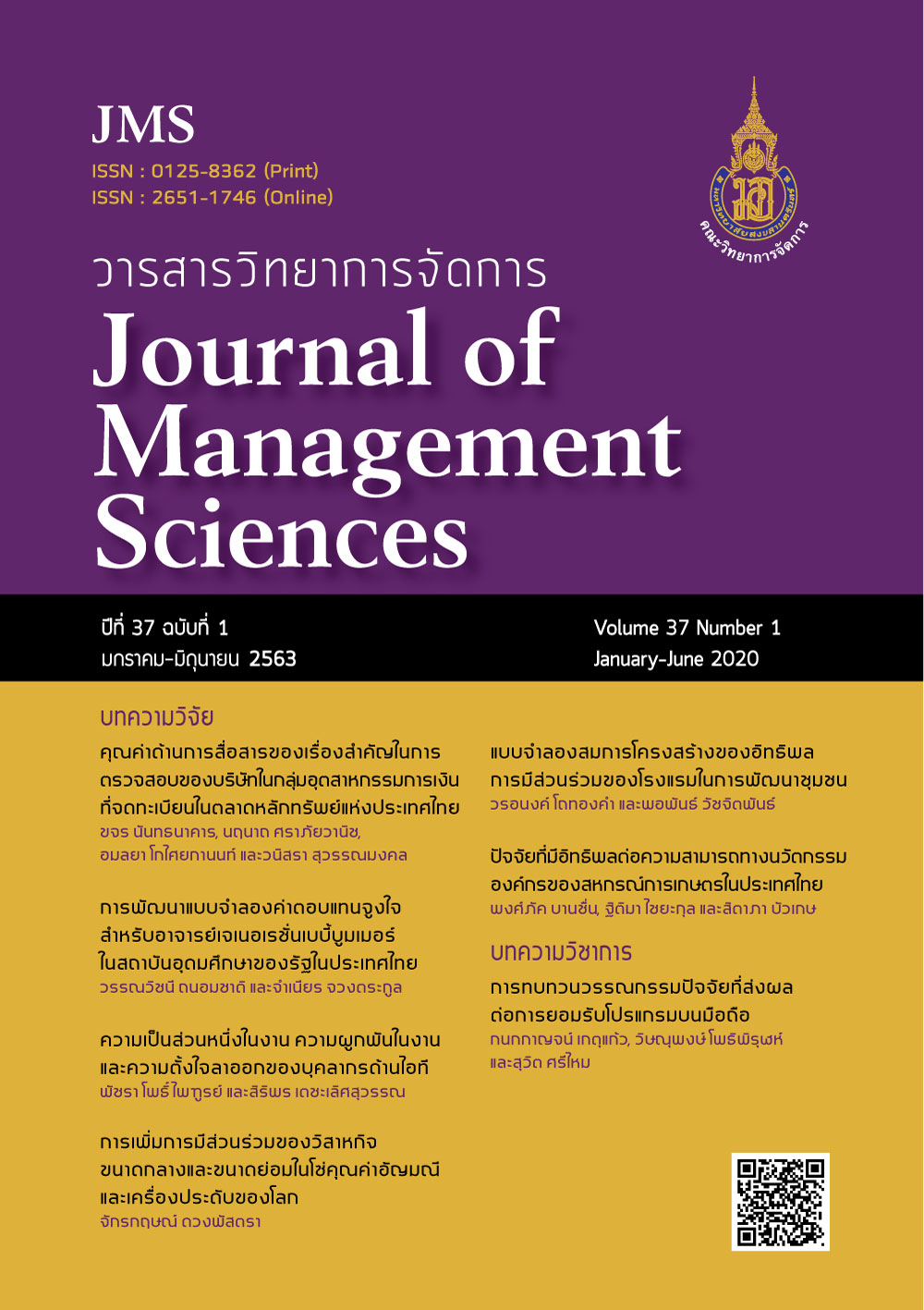A Structural Equation Model of Hotel Involvement in Community Development in Thailand
Main Article Content
Abstract
The objective of this research is to study the causal relationship and the structural equation model (SEM) of hotel involvement in community development in Thailand. The six latent variables are involvement in internal hotel operations, involvement in community social and cultural development, involvement in community environmental development and involvement in community economic development, problems and obstacles in community development participation, and benefits of involvement in community development. The questionnaires were mailed to managers of the 1-5 star hotels which were members of the Thai Hotels Association and 221 out of 800 members completed the questionnaires. The analysis was performed by using the LISREL software which indicates that the proposed model confirms the hypotheses and satisfies the goodness-of-fit criteria. Results also indicate that benefits of involvement in community development are directly influenced by involvement in community social and cultural development, environmental development and economic development initiated through involvement in internal hotel operations. Meanwhile, the low scored problems and obstacles in community development participation have direct but small negative influences on the benefits of involvement in community development. The results of the research led to the increase of the capability to participation in the internal activities of the hotel for social and community development activities, such as cooperation with business in the community. Collaboration with educational institutions by having good and effective project management.
Article Details

This work is licensed under a Creative Commons Attribution-NonCommercial-NoDerivatives 4.0 International License.
All published articles are SJMS’s copyright. The editorial board allows all published articles to be copied, excerpted, or disseminated with academic citation.
References
Accor Hotels. 2016. Planet 21. Retrieved May 1, 2016, from http://www.accorhotels.com/gb/sustainabledevelopment/index.shtml
ASEAN Tourism. (2016). ASEAN GREEN HOTEL STANDARD. Retrieved January 11, 2016, from https://www.asean.org/storage/2012/05/ASEAN-Green-Hotel-Standard.pdf
Amari Hotels Resort and Spa. (2018). Social responsibility. Retrieved July 8, 2018, from https://www.amari.com/social-responsibility/
Aref, F., & Ma’rof, R. (2008). Barriers to community participation toward tourism development in Shiraz, Iran. Pakistan Journal of Social Sciences, 5(9), 936-940.
Aref, F., & Ma’rof, R. (2009). Assessing the level of community participation as a component of community capacity building for tourism development. European Journal of Social Sciences, 8(1), 68-75.
Babbie, E. (2002). The basics of social research. Belmont, CA,: Wadsworth.
Barnard, C. I. (1968). The functions of the executive (Vol. 11): Harvard university press.
Centara Hotels and Resorts. (2014). Good Corporate Governance Principles Guideline for operating the Group. Retrieved June 11, 2018, from https://centel.listedcompany./misc/AR/20150403-CENTEL-AR2014-TH.pdf
Cvelbar, K. L., & Dwyer, L. (2013). An importance-performance analysis of sustainability factors for long-term strategy planning in Slovenian hotels. Journal of Sustainable Tourism, 21(3), 487-504.
Dusit Hotels and Resort. (2018). Corporate social responsibility. Retrieved June 11, 2018, from https://www.dusit.com/th/csr/online
Elkington, J. (1997). Cannibals with forks - the triple bottom line of twenty-first century Business. Mankato, MN: Capstone.
Freeman, R. E. (1984). Strategic management: A stakeholder approach. Boston, Pitman. Retrieved June 11, 2018, from http://books.google.com/books
Garver, M. S., & Mentzer, J. T (1999). Logistics research methods: employing structural equation modeling to test for construct validity. Journal of Business Logistics, 20(1), 33-57.
Goel, P. (2010). Triple bottom line reporting: An analytical approach for corporate sustainability. Journal of Finance, Accounting and Management, 1(1), 27-42.
Han, H., Hsu, L. T. J., Lee, J. S., & Sheu, C. (2011). Are lodging customers ready to go green? An examination of attitudes, demographics, and eco-friendly intentions. International Journal of Hospitality Management, 30(2), 345-355.
Hair, J. F., Black, W. C., Babin, B. J., & Anderson (2010). Multivariate data analysis (7th ed.). Pearson Education,. Upper Saddle River, NJ.
Hsieh, Y. C. (2012). Hotel companies' environmental policies and practices: a content analysis of their web pages. International Journal of Contemporary Hospitality Management, 24(1), 97-121.
Mandy Nok Hotel. (2018). Corporate social responsibility. Retrieved October 10, 2018, from http://www.mandynokhotel.com/th/index.php
Mrema, A. A. (2015). Contribution of tourist hotels in socio-economic development of local communities in Monduli District, Northern Tanzania. Journal of Hospitality Management and Tourism, 6(6), 71-79.
Mustapha, N., Azman, I., & Ibrahim, Y. (2013). Barriers to community participation in tourism development in island destination. Journal of Tourism, Hospitality & Culinary Arts, 5(1), 102-124.
Nanthaphaibun, C. (2012). Hotel Business. Se-Education, Bangkok.
Noonin, S., Jadesadalug, V., & Sansook, J. (2017). The Development Model of Strategic Corporate Social Responsibility for Hotel Business’s Sustainable Performance in Thailand. Dusit Thani College Journal, 11(Special Issue May 2017), 171-185.
Placet, M., Anderson, R., & Fowler, K. M. (2005). Strategies for sustainability. Research-Technology Management, 48(5), 32-41.
Porter, M. E., & Kramer, M. R. (2006). Strategy and society: the link between corporate social responsibility and competitive advantage. Harvard business review, 84(12), 78-92.
Porter, M. E., & Kramer, M. R. (2012). Shared Value: Die Brücke von Corporate Social Responsibility zu Corporate Strategy. In Corporate Social Responsibility, 137-153. Berlin, Germany: Springer Gabler.
Technology Promotion Association (Thai-Japanese). (2010). Hotel and resort business. Retrieved October 10, 2018, from http://www.sme.go.th/SiteCollectionDocuments
Thotongkam, W., & Vachajitpan, P. (2018). Involvement in community development of hotels in Thailand. Proceeding of the 7th International Conference on Advancement of Development Administration 2018 Social Sciences and Interdisciplinary Studies (The 7th ICADA 2018-SSIS). National Institute of Development Administration (NIDA), Bangkok, Thailand, May 2018. p.22.
Thotongkam, W., & Vachajitpan, P. (2018b). Factor analysis of hotel involvement in community development. Proceeding of the 10th National Conference on Administration and Management. Faculty of Management Sciences, Prince of Songkla University Thailand, June 30, 2018, 845-853.
Wyngaard, A., & De Lange, R. (2013). The effectiveness of implementing eco initiatives to recycle water and food waste in selected Cape Town hotels. International Journal of Hospitality Management, 34, 309-316.
Xu, X., & Gursoy, D. (2015). Influence of sustainable hospitality supply chain management on customers’ attitudes and behaviors. International journal of hospitality management, 49, 105-116.

